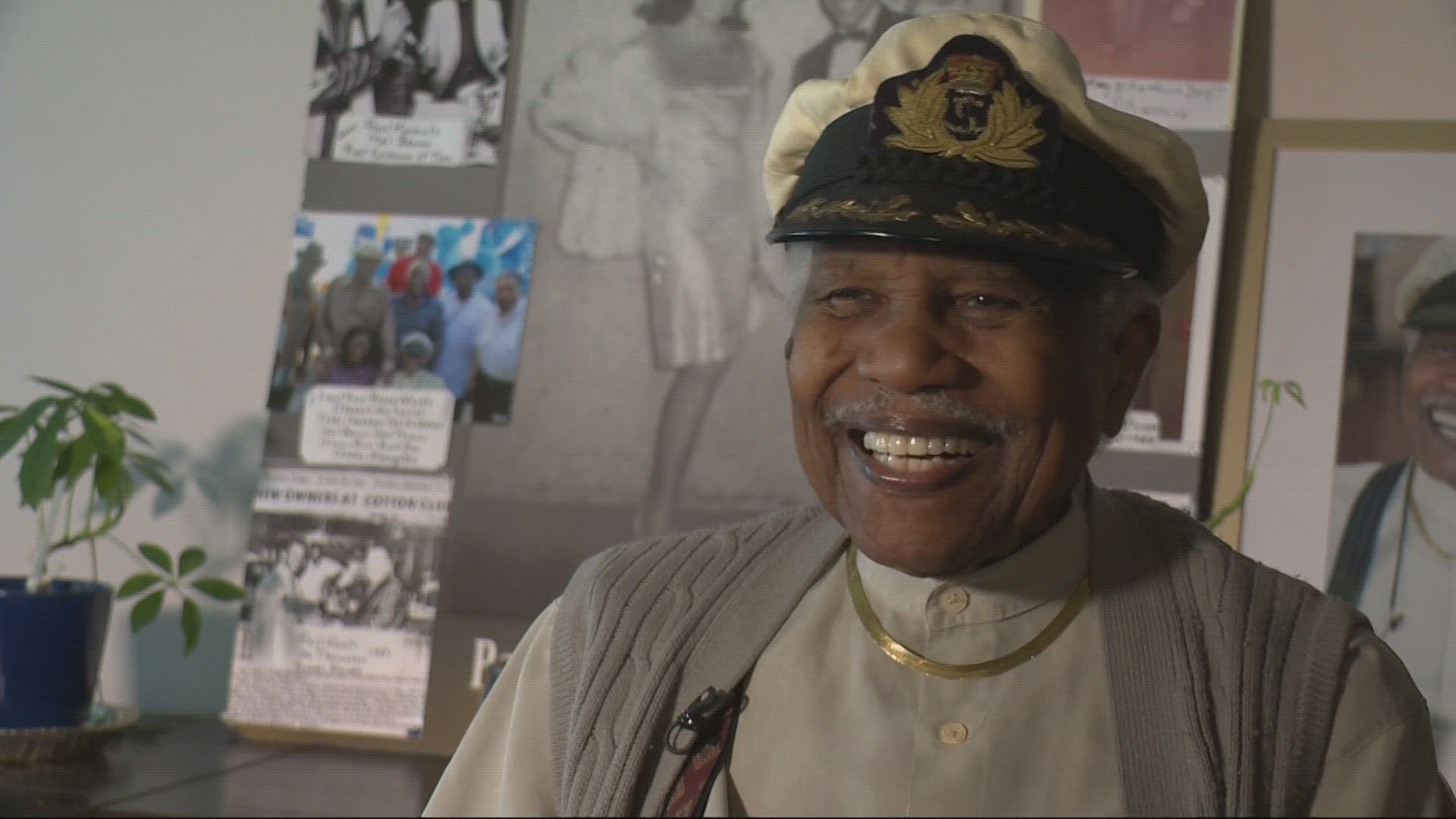PORTLAND, Ore. — Paul Knauls' laugh is infectious and hard to miss. He is quite the character and a well-known figure in the history of Portland's Albina neighborhood.
"I was 92. I said I had things to do, but now I'm 93 and I got places to be!" He said with a laugh from his living room.
"They call me the unofficial mayor of Northeast Portland," Knauls said, referring to a nickname given to him by an old friend.
From owning a night club, a hair salon and two restaurants, Paul Knauls and his wife, Geneva, have made their mark on the city. Now a new low-income housing complex on Northeast Alberta Street is named after them.
Knauls, the son of a coal miner, was born and raised in Arkansas. He grew up in the 1930s and 1940s during a time of racial segregation.
"You knew what you were supposed to do. You knew that was a white fountain, that said whites and one said colored and you knew not to drink out of the white fountain, you'd drink out of the colored fountain," Knauls said.
After graduating high school in 1949, he joined the U.S. Air Force. The year prior on July 26, 1948, President Harry Truman signed an executive order that mandated the desegregation of the U.S. military.
Knauls was stationed at Fairchild Air Force Base near Spokane, Washington. He said he was among the first Black airmen stationed there.
"Everybody said, 'You're the first one I've seen! You're the first one I've seen!" He said laughing. "They slowly integrated."
During his four years in the service, he learned how to repair typewriters. He left the service in 1953. Using his skills as a typewriter repairman, he continued working in the private sector in Spokane. He picked up three other jobs at the same time to make ends meet.
"I worked from 8-5, I repaired typewriters. From 6-10 I worked at the Davenport Hotel," he said, recounting the jobs he held. "I taught skiing on the weekends, and then on Sundays I cleaned up the shop where we worked."
He did this for 12 years, hoping to save enough to buy his own night club. He said on the weekends he would travel to Portland and go dancing at different clubs. In the 1960s during one of his trips, he made a stop at the Cotton Club along north Vancouver that was lacking business.
"It's 1 o'clock in the morning and nobody's in there. The place is not jumping at all," he said.
Knauls convinced the owner to let him greet people at the door and soon, he said, the place was busy again. But once Knauls stopped showing up, business died down. He approached the owner and asked him if he had thought of selling. Within three months, he had purchased his own night club and was the new owner of the Cotton Club.
"Business was great. People started showing up. It was a place to see, be seen. Everybody dressing up to come," he said.
Knauls met his wife, Geneva, shortly after buying the club. He recalled one time she had gone into Portland to watch a performance featuring Sammy Davis, Jr. and invited him back to her husband's club. Davis wasn't the only famous face to stop by the Cotton Club.


"All the entertainers that entertained downtown, this is where they would come after they finished a show, like Sammy Davis Jr., Big Mama Cass from The Mamas and the Papas," Knauls said.
For five years, business was good at the Cotton Club until 1968.
"(Dr. Martin Luther King, Jr.) got killed and the whites stopped coming because the Blacks were there and the Blacks stopped coming cause the whites were there and left me here with just a few customers who would still come," he said.
The Cotton Club closed down in 1970. Today, another business operates inside.
The Knauls would open up three other businesses: Geneva's Shear Perfection, a hair salon his wife Geneva ran, and two restaurants, Paul's Café on Russell and Geneva's Lounge.
Knauls was not only a businessman, but also an activist.
He spent eight years being the driving force behind the funding and construction of The Dream statue depicting Martin Luther King, Jr. that sits at the corner of Convention Center along Northeast Martin Luther King Jr. Boulevard.
He calls it his crowning achievement, "Except for marrying my wife, that was my greatest accomplishment was the Martin Luther King statue."
Geneva Knauls passed away in 2014.


These days, Paul Knauls' likeness can be found around north and Northeast Portland. There's a plaque along North Williams that commemorates the Knauls' contributions.
His smiling face and signature white hat is painted on a pillar outside the Trail Blazers Boys and Girls Club and along Northeast Alberta Street is a standing marker that tells his story to those walking by.
The newest location to bear their name is the Paul and Geneva Knauls Building on Northeast 8th Avenue and Northeast Alberta Street. Do Good Multnomah operates the low-income, 31-unit apartment complex. It gives priority to veterans, just like Knauls.
"I think my legacy has already been done," he said. "I love northeast Portland. I love the people of northeast Portland. We worked together to make it the best it could be."
VIDEO PLAYLIST: What's in a Name?

